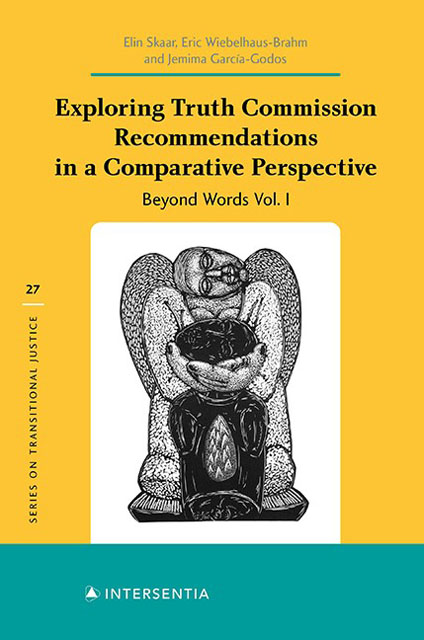Book contents
- Frontmatter
- Preface
- Contents
- List of Acronyms and Abbreviations
- List of Tables and Figures
- Chapter 1 Exploring Recommendations
- Chapter 2 Researching Recommendations
- Chapter 3 Counting and Classifying Recommendations
- Chapter 4 Formulating Recommendations
- Chapter 5 Case Studies of Implementation
- Chapter 6 A Cross-National Analysis of Implementation
- Chapter 7 Conclusions
- Appendix I Latin American truth Commission Reports
- Appendix II Information on 13 Latin American truth CommissionReports and their Recommendations
- Appendix III Excerpts from the truth Commission Recommendations Data Code Book
- Appendix IV Implementation of the Recommendations Made by 13 Latin American truth Commissions
- Appendix V Implementation Rates for Recommendations Made by 13 Latin American truth Commissions, by Category
- Appendix VI Overview of Commissioners of 12 Formal Latin American truth Commissions
- Appendix VII Latin American Countries Signatories to and Ratification of the International Convention for the Protection of All Persons from Enforced Disappearance (2006)
- Bibliography
- Index
- About the Authors
Chapter 7 - Conclusions
Published online by Cambridge University Press: 19 November 2022
- Frontmatter
- Preface
- Contents
- List of Acronyms and Abbreviations
- List of Tables and Figures
- Chapter 1 Exploring Recommendations
- Chapter 2 Researching Recommendations
- Chapter 3 Counting and Classifying Recommendations
- Chapter 4 Formulating Recommendations
- Chapter 5 Case Studies of Implementation
- Chapter 6 A Cross-National Analysis of Implementation
- Chapter 7 Conclusions
- Appendix I Latin American truth Commission Reports
- Appendix II Information on 13 Latin American truth CommissionReports and their Recommendations
- Appendix III Excerpts from the truth Commission Recommendations Data Code Book
- Appendix IV Implementation of the Recommendations Made by 13 Latin American truth Commissions
- Appendix V Implementation Rates for Recommendations Made by 13 Latin American truth Commissions, by Category
- Appendix VI Overview of Commissioners of 12 Formal Latin American truth Commissions
- Appendix VII Latin American Countries Signatories to and Ratification of the International Convention for the Protection of All Persons from Enforced Disappearance (2006)
- Bibliography
- Index
- About the Authors
Summary
Words are the only things that last forever; they are more durable than the eternal hills.
– William Hazlitt, essayist (1778 – 1830)The 13 Latin American truth commission reports analyzed in detail in this book have proven to be durable testimonies to the work undertaken by the commissions that wrote them. Written over a period of almost 30 years (1983 – 2014), these reports still exist in physical and/or digital form. The reports are easily accessible and widely known in some countries, like Chile, Argentina, and Peru. By contrast, to get hold of a hard copy of the truth commission report in Uruguay, Panama, or Haiti requires a bit of determination and detective work. Whether easily accessible or not, the recommendations made in all these reports jointly form an important legacy of the truth-finding efforts of 11 Latin American countries. In many countries, they remain important to political discourse.
In this project, we advance understanding of truth commissions and their impact in important ways. Although we have not been principally concerned with the impact of truth commissions, we do argue that that implementation of their recommendations conditions some of the short-term as well as longterm impact of truth commissions. Conceptually, then, we differentiate the “implementation” of specific recommendations from the “impact” of the truth commission that issued them. In this project we understand implementation both as a process (the implementation process) and as specific events (implementing events) that result in some policy, legal, or procedural change. To demonstrate this, we systematically examined the kinds of recommendations Latin American truth commissions have produced. Further, we explored the circumstances in which those recommendations were formulated. Finally, we determined how, when, and by whom the recommendations have been implemented. Through a comparative approach, we have sought to uncover the factors that shape the recommendations produced by truth commissions, and to examine patterns of implementation across time and space. We defined recommendations not as commissions themselves do, which is often messy and complex, but by distinguishing individual implementing events. This enabled a more accurate assessment of the extent to which governments have acted upon commissions’ counsel. To examine patterns in formulation and implementation across the region, we developed a system for classifying recommendations according to their different characteristics. Further, we identified contextual factors that we hypothesize shape the likelihood of implementation.
- Type
- Chapter
- Information
- Exploring Truth Commission Recommendations in a Comparative Perspective: Beyond Words Vol 1 , pp. 205 - 228Publisher: IntersentiaPrint publication year: 2022

